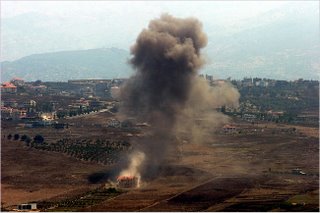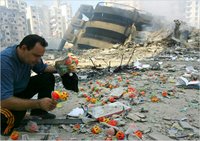Lately. . .

I've been depressed over the relentless Hezbollah bombings these last few weeks. (Beirut artist, Mazen Kerbaj's recordings of the bombings hear (t)here). Why am I so moved by this particular situation? more than Iraq, say? or the Congo? Horrific enough, it's not the pictures of tanks, death and rumble that strikes a chord, but perhaps the marks of domesticity against the stark backdrop of war: lost high heel sandals and toys among rebar, brightly patterned bed linens in bomb shelters, birds in cages hanging on tree limbs.
 Something about a normalcy lost that I connect to or a everyday humanity that survives despite war, which seems very much an abstraction to me. Feeling helpless and existential about what seems the uselessness of artmaking and blogging about art concepts, change and power from the comfort of my studio. Then, when you want to just throw in the towel...you see some great art (smart, well-crafted and thought provoking), and a sense of hope is restored and an urgency to go forward takes over.
Something about a normalcy lost that I connect to or a everyday humanity that survives despite war, which seems very much an abstraction to me. Feeling helpless and existential about what seems the uselessness of artmaking and blogging about art concepts, change and power from the comfort of my studio. Then, when you want to just throw in the towel...you see some great art (smart, well-crafted and thought provoking), and a sense of hope is restored and an urgency to go forward takes over. I saw Nina Katchadourian's multi-channel video installation, Installation of Accent Elimination. "Inspired by the posters advertising courses in “accent elimination,” Katchadourian’s multi-channel video piece Accent Elimination involved working with her parents and a speech improvement coach intensively for several weeks in order to “neutralize” her parents accents and then teach each of their accents to her. Both Katchadourian’s parents have distinct and hard-to-place accents, although they have lived in the United States for over 40 years. The very existence of these courses speak to the complexities of assimilation, self-image, and the tricky maneuvering between two desires: to preserve the distinctive marks of one's culture or to decrease them in order to seem less foreign. In Accent Elimination, the accent is taken up as a material object, an heirloom that can be inherited. Although accents are in so many ways clear markers of ethnicity, culture, and origin (things that are linked to a sense of identity inherited from a parent), an accent itself is extremely elusive. In this video, one sees how Katchadourian and her parents struggle to hear and imitate what is so close at hand and yet so difficult to access."
I happened to walk in on the videos as the artist and her parents in accented and "neutralized" tongues said, "Where did you meet?", "We met in Beirut." Something about that moment, wanting to find connection between my life here and a situation so far away, tragic, and (seemingly) foreign.

0 Comments:
Post a Comment
<< Home